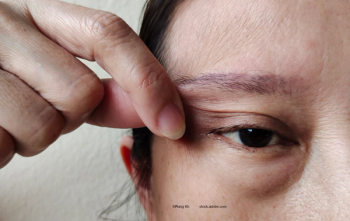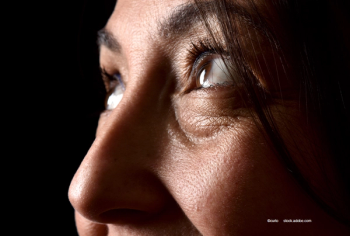
Upper lid elevation with topical oxymetazoline 0.1%: providing a better view
Topical oxymetazoline HCL ophthalmic solution 0.1% (RVL-1201, RVL Pharmaceuticals, Inc.) has the potential to treat patients with varying degrees of severity of acquired ptosis compared with vehicle.
Topical oxymetazoline HCL ophthalmic solution 0.1% (RVL-1201, RVL Pharmaceuticals, Inc.) has the potential to treat patients with varying degrees of severity of acquired ptosis compared with vehicle, reported Wendy W. Lee, MD, MS, from the Bascom Palmer Eye Institute, University of Miami Miller School of Medicine, Miami.
Dr. Lee and colleagues reported that the most pronounced effects were seen in subjects with more severe ptosis.
The drug, an α-adrenergic receptor agonist, works by stimulating the α-adrenergic receptors on Muller’s muscle, which results in contraction and eyelid elevation.
This study continued the analysis of 2 phase 3, randomized, multicenter studies (RVL-1201-201 and RVL-1202-202)1,2 by evaluating subgroups of patients based on the degree of the ptosis severity, i.e., mild, moderate, or severe, across the study population.
The study patients administered the drop once daily to the affected eyes.
The study
Dr. Lee and colleagues pooled the data from the phase 3 studies, in which the participants administered the drug one daily to both eyes for 42 days.
All patients had acquired ptosis and a superior visual defect in at least 1 eye.
The patients were divided into subgroups based on the degree of the ptosis in the study at baseline.
The degree was based on the Baseline marginal reflex distance 1 (MRD-1) range, with 0.0 mm (most severe) and 2.0 mm (least severe).
The MRD-1 is the distance between the center of the pupillary light reflex and the central margin of the upper eyelid with the eye in primary gaze, Dr. Lee explained.
The primary study end point was the mean change from baseline in upper eyelid elevation (MRD-1) in the study eye, on days 1 and 14 at 2 and 6 hours after the drug was instilled.
The secondary endpoints were the mean changes in the upper eyelid elevation in the non-study eye and the eyelid symmetry.
Results
The investigators reported that RVL-1201 “provided significant improvement (p<0.05) compared with vehicle in subjects with a baseline MRD-1 ranging from 0 mm to 2.0 mm.”
The authors also reported that the drug provided similar improvements across the severity subgroups, with a significant effect compared to vehicle on day 14.
An additional finding was that the patients with a baseline MRD-1 of 3 mm also had a significant improvement in the upper eyelid elevation on day 14.
Regarding eyelid symmetry, the baseline degree across the population was generally mild, and no overall shifts in the severity of the asymmetry was seen.
The authors concluded, “These findings suggest the potential for RVL-1201 in the treatment of patients with acquired ptosis of varying severity.”
This report is adapted from Dr. Lee’s presentation at the Women In Ophthalmology 2021 Summer Symposium, August 26-29, Amelia Island, FL.
The study was sponsored by RVL Pharmaceuticals, Inc.
---
References
1. Slonim CB, Foster S, Jaros M, et al. Association of oxymetazoline hydrochloride, 0.1%, solution administration with visual field in acquired ptosis: a pooled analysis of 2 randomized clinical trials. JAMA Ophthalmol 2020;138:1168-75.
2. Bacharach J, Wirta DL, Smyth-Medina R, et al. Rapid and sustained eyelid elevation in acquired blepharoptosis with oxymetazoline 0.1%: randomized phase 3 trial results. Clin Ophthalmol 2021;15:2743-51.
Newsletter
Don’t miss out—get Ophthalmology Times updates on the latest clinical advancements and expert interviews, straight to your inbox.





























